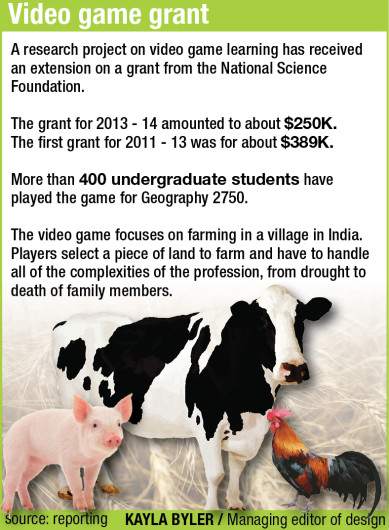Professors could soon be doling out video games as part of homework assignments after researchers were granted nearly $250,000 for the 2013-14 academic year.
A research project on video game learning has received an extension on a grant from the National Science Foundation, said Ola Ahlqvist, an associate professor of geography and head researcher on the project.
“We’re looking at how should this game be introduced in a classroom and what are the best ways to provide feedback and things in the game so students can learn the best way possible,” Ahlqvist said. “That’s what the grant is about — to understand how to use technology like this to help learners.”
The video game focuses on farming in a village in India. Players select a piece of land to farm and have to handle all of the complexities of the profession, from drought to death of family members, Ahlqvist said.
“It’s trying to be pretty realistic about the situation in India,” he said.
More than 400 undergraduate students have played the game as part of a weekly homework assignment for Geography 2750, a world regional geography general education course, Ahlqvist said in an email.
The grant for 2013-14 amounted to nearly $250,000, Ahlqvist said. The first grant for 2011-13 was for about $389,000.
“The funding has primarily provided direct support for three faculty and four graduate students in geography, computer science and physics education,” he said.
The difference of research focus for this grant, as opposed to the one before it, switches from what students are learning to how they’re learning, said Rajiv Ramnath, an associate professor of practice in computer science and engineering and researcher on the project.
“We have a sense of what (students) learn about after they play the game,” Ramnath said. “What we’re trying to figure out now is how they learn, what kind of concepts do they form in their minds, what kind of strategies do they use, how does the computer affect how they learn, those kinds of things.”
The research has received positive feedback from the science community at national conventions because of its ability to show students a concept rather than just telling them, Ahlqvist said on the phone.
“There’s a ton of interest in doing this,” he said, “because people see the potential of being able to use all of the existing geographic data as game worlds and essentially come up with all kinds of interesting simulations or gaming scenarios anywhere in the world.”
The team plans to work with experts from the University of Wisconsin-Madison’s Games, Learning and Society center to improve the game, Ahlqvist said.
“That allows us to learn from what they do and help us bring ourselves up to speed with the cutting edge in that area,” he said.
Some students see this type of learning as beneficial to other subject areas outside of geography as well.
“I’ve heard a lot of studies actually about neurosurgeons and a correlation between video game experience and success in noninvasive surgery,” said Casey Lower, a second-year in neuroscience. “There are a lot of similarities in video games and modern technology that’s used (in other professions), so I would say it’s a good idea.”
Others said the success of the game in the classroom depends on its complexity.
“(If the game would be effective for students) would mostly depend on how good the game is and how accurate it is,” said Devin VanCuren, a second-year in philosophy. “Surely it might be more (educational) than reading a textbook, but I don’t know.”
The possibilities for expansion into other areas of academia are huge, Ramnath said.
“We can apply it to computer science learning, or physics learning, or other subject areas as well as having a more scientifically sound manner as opposed to trying and hoping people get interested,” he said.



